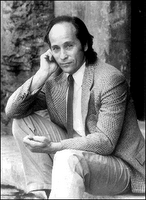Odds & Ends
Our Short Memory. Gore Vidal, who's lived and written long enough to have just published his second memoir (here's his first), likes to call his native land The United States of Amnesia. But Los Angeles is perhaps even worse than the rest of the country. In a recent NYTimes piece, the acutely insightful urban historian Joel Kotkin had this observation about the city he's called home for the last 30 years: "Los Angeles is such a rapidly evolving city. There is an enormous turnover of people here. You talk to people about the '80s here and it's like you are talking about the Conquistidors."
Google Tends to Take the Path of Expediency. Adam Penenberg, a business writer turned journalism prof (who is credited with blowing the whistle on infamous New Republic plagiarizer Stephen Glass while at Forbes Magazine) has a great piece about Google in the current Mother Jones Magazine. He notes that the company bears keeping a close eye on, since it has better information on most people than even the infamous National Security Agency. He writes: "From the start, Google's informal motto has been 'don't be evil,' and the company earned credibility early on by going toe-to-toe with Microsoft over desktop software and other issues. But make no mistake. Faced with doing the right thing or doing what is in its best interests, Google has almost always chosen expediency." And speaking of Mother Jones, that article that I mentioned some time ago about Cleveland's foreclosure scandal (written by Penenberg's NYU colleague, journalism prof Alyssa Katz) is now online. Do read it when you can. It's an eye-opener. And while you're on that subject, you might also check out some great additional coverage by my favorite grassroots factsmonger, Bill Callahan, here.
Our National Tourette's Syndrome. I thought Time's James Poniewozik had one of the more interesting takes on the whole Michael "Kramer" Richards racial-rant affair. When combined with the latest Mel Gibson outrage, the scuttled O.J. Simpson book and other bizarre moments, he writes, "it's as if the U.S. were experiencing collective Tourette's, regurgitating decades of dutifully sublimated hate." He also makes a great point I'd never thought of: that our often-reflexive distrust of political correctness can sometimes get us in trouble. Speaking of the (what I consider lunatic) popularity of the Borat movie, he writes "it's reasonable to ask whether our culture has become so anti-p.c. that a racist comic can defend his rant, as Richards did, as going into character."
God Bless Sy Hersh. The New Yorker's Seymour Hersh is in his 70s, but you'd never know it by his astounding output. He fired away again last week with this rousing piece on the White House's plans for Iran, in which he explores whether the post-election ouster of Rumsfeld will only prove to be so much window dressing without a real corresponding change in policy. While the uneducated masses might consider his longtime rival Bob Woodward America's leading investigative reporter, more discriminating readers (I hope) understand that he's merely been playing the part for several years. Hersh, though, is the real deal. And it's his stamina (along with his moral seriousness) that sets him apart. I count 19 major articles carrying his byline in this New Yorker archive of post-9/11 coverage, and it may be missing a piece or two. The way he has uncovered what's really been happening behind closed doors in the capital for decades simply defies belief. I would argue that his relentlessness on this subject helped change the entire course of the American media's coverage of the war (as they tried their best to keep up with him), and thus influenced the elections and the course of history. There will never be another like him.









